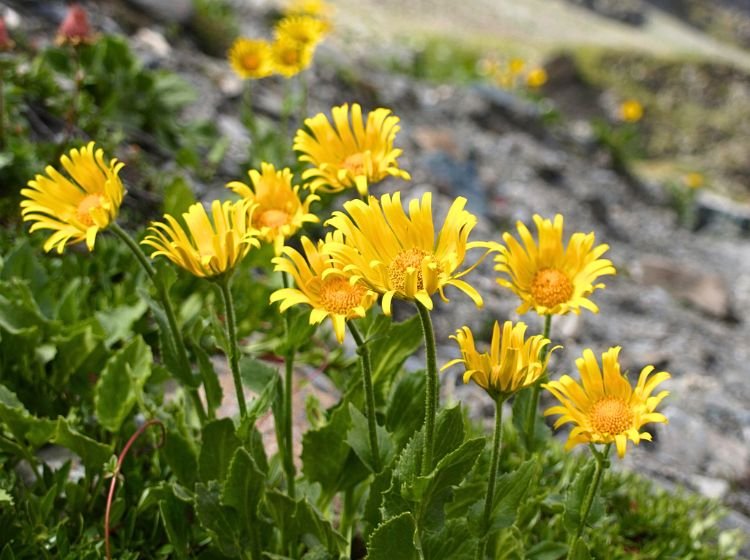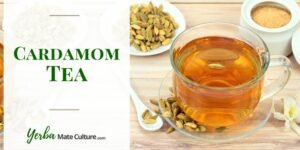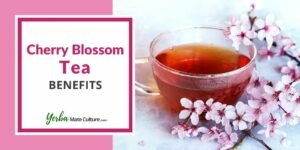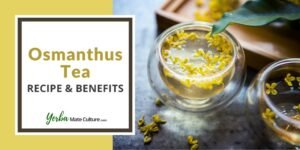With a world full of potent natural remedies, it’s no wonder you might be curious about the potential benefits of arnica tea.
This herbal elixir has some unique healing properties through its anti-inflammatory and immune-boosting capabilities.
But before we go any further, you should know that oral use of arnica is very risky due to the toxic nature of helenalin, the anti-inflammatory ingredient in Arnica. To avoid any risks, I recommend only topical or homeopathic use of this herb.
However, you may find comfort in knowing that arnica tea has been used for centuries to help alleviate a variety of ailments. Among its most common uses are relieving muscle and joint pain, skin inflammation, and even hair loss.
By incorporating Arnica tea or tincture into your wellness routine, you can tap into the plant’s natural resources to support your overall health.
Read this guide to learn more about the benefits, and potential side effects of Arnica tea. I will also tell you how to find high-quality arnica products and recommend some alternative remedies.
What is Arnica Tea?
Arnica tea is a popular herbal remedy made from the flowers of the Arnica montana plant, commonly known as Leopard’s bane, Mountain tobacco, or Mountain arnica. This plant belongs to the Asteraceae family, which also includes sunflowers.

Known for its natural pain-relieving properties, arnica tea is often used to help alleviate various types of discomfort.
You might also come across Wolf’s bane as another name for Arnica montana. It is essential to not confuse this with the highly toxic plant Aconitum napellus, also known as Wolf’s bane. While they share a common name, the plants, and their uses are entirely different.
Arnica Tea Benefits Explained
Traditionally, Arnica has been used to treat muscle pain, joint pain, inflammation, and bruising.
When applied topically, it can also help reduce the appearance of scars, acne, and blemishes, as well as treat skin conditions like eczema and poison ivy.
Arnica tinctures and gels can also be used to cleanse the scalp and reduce dandruff, itchiness, and hair tangling when applied regularly.
The herb contains a toxin called helenalin, which is also the active ingredient providing anti-inflammatory properties. It can be deadly if consumed in large quantities, so it’s crucial to always use it with caution and follow the recommended dosage guidelines.
1. Pain Management
Drinking arnica tea might help you manage pain more effectively. Its analgesic properties can play a role in alleviating all sorts of discomforts, such as the ones caused by arthritis or injury.
However, according to research using Arnica extract or gel as a topical treatment might be a safer and more effective option for relieving muscle and joint pain.
2. Anti-Inflammatory Effects
In addition to pain relief, arnica tea has anti-inflammatory compounds that contribute to reducing inflammation in your body, especially in muscles and joints.
Thus, it can be a great natural remedy if you’re looking for alternative ways to tackle inflammation-related issues. Another great option is manglier tea, a traditional herbal remedy with anti-inflammatory and anti-viral properties.
3. Treatment of Bruises and Swelling
If you’re prone to bruising or suffer from swelling, arnica tea may prove beneficial.
Its gentle effects on your skin are known to help open up blood vessels, reducing the appearance of bruises and soothing inflammation simultaneously.
4. Osteoarthritis Relief
Arnica may be an effective remedy for osteoarthritis. A 2007 study found that Arnica tincture worked as well as topical NSAIDs in managing the pain associated with hand osteoarthritis.
By regularly including Arnica treatment in your routine, you might notice an improvement in your arthritis symptoms.
Arnica gel can also be an effective herbal remedy for gout. It’s likely to reduce or relieve the symptoms when applied directly to the affected joint.
5. Hair Loss Prevention
Arnica tea also has a positive impact on hair care as it may promote hair growth and reduce hair loss. You can either consume the tea or use it topically on your hair to reap its benefits.
6. Skin Health Improvement
You can also use Arnica to enhance your skin health. Its antibacterial and antiviral properties work to prevent infections, reduce inflammation, and soothe irritated skin.
How to Use Arnica Tea and Topical Treatments
It’s important to note that consuming Arnica tea should be done with caution because the herb can be toxic in large quantities.
Oral consumption of Arnica tea is risky and can only be recommended under the supervision of a medical professional.
Preparation and Consuming of Arnica Tea
To prepare arnica tea, simply steep a few fresh or dried arnica flowers (or a tea bag) in boiling water for 3-5 minutes. Make sure you remove the flowers after brewing to avoid consuming potentially harmful substances.
So how much arnica tea can you drink a day?
I recommend consulting your doctor about the safe amount for daily consumption. In any case, don’t start with more than one cup a day to see how your body reacts to it.
You can sweeten the tea with honey and add a dash of lemon juice to enhance the taste.
Topical Applications
Arnica is often used in the form of gels, ointments, and creams for topical application. When used topically, it can help reduce pain, inflammation, and bruising on the skin.
To use an arnica gel or cream, you can gently massage it onto the affected area, and it should be absorbed by the skin without much hassle.
Keep in mind that topical arnica products should not be applied to open wounds or broken skin. It’s also important to follow the manufacturer’s recommended dosage and usage instructions to ensure safe and effective application.
Complementary Remedies
Arnica tea can be supplemented with other natural remedies to enhance its effectiveness or target specific symptoms.
For instance, combining it with ginger can help to boost its anti-inflammatory effects and provide additional pain relief. Additionally, you may consider using homeopathic arnica tablets or tinctures for a more convenient and controlled way to experience the herb’s benefits.
As always, consult with your healthcare professional before adding new remedies to your wellness routine.
Is It Safe to Drink Arnica Tea?
You should be very cautious when drinking Arnica Tea as the herb contains a toxin called helenalin. This toxin can be deadly if consumed in large quantities and medical supervision is recommended during oral consumption of Arnica.
While some people may use arnica tea as part of homeopathic treatment, robust evidence-based data about its safety for consumption is scarce. Therefore, it’s vital to approach drinking arnica tea with extreme caution.
Although oral forms, such as teas, tinctures, and tablets, are available, it’s important to prioritize safety and consider alternative methods to harness arnica’s potential health benefits.
Arnica is more widely recognized for its topical application in the form of gels to manage muscle and joint pain. It is believed that arnica contains anti-inflammatory compounds that aid in relieving such discomfort when applied externally.
Side Effects and Precautions
There are definitely some possible side effects you should know about before using Arnica tea. The highest risk is related to the toxic effect of orally consuming too much Arnica.
Toxicity and Poisoning
While arnica is known for its potential benefits in pain management and reducing inflammation, it is important to note that it can be toxic when consumed improperly.
Ingesting large amounts of arnica can lead to poisoning, characterized by symptoms such as nausea, dizziness, shortness of breath, and anxiety.
Make sure not to consume arnica tea in excessive amounts or use it on broken skin, as this can increase the risk of toxicity.
Allergic Reactions
As with any herbal product, you may experience an allergic reaction to arnica. This can include redness, itching, swelling, and worsened bruising.
If you notice any of these symptoms after using arnica, stop its use and consult your doctor immediately.
Pregnancy and Breastfeeding Caution
If you are pregnant or breastfeeding, it is best to avoid arnica, as its safety during these periods has not been well-established.
Consult your healthcare provider for other pain management alternatives during pregnancy and breastfeeding.
Interaction With Medications
Be cautious when combining arnica with other medications, especially nonsteroidal anti-inflammatory drugs (NSAIDs) or blood thinners like warfarin or ginkgo.
Arnica contains antiviral flavonoids and toxins that may interfere with blood pressure medication, increasing the risk of internal bleeding and adverse reactions.
Buying Guide for Arnica Products
To ensure you’re selecting a high-quality arnica product, here are a few pointers to consider:
- Research the brand: Look for reputable brands with positive reviews and a history of providing high-quality products. They should have transparent information about their manufacturing processes and sourcing of arnica plants.
- Check for third-party testing: Independent lab testing can help validate the quality, purity, and potency of the product. Look for arnica products that have undergone third-party testing and carry a seal of approval from a recognized organization.
- Read the label carefully: Make sure the arnica product you choose is suitable for your intended use, whether it’s a topical application like oils or gels, or internal consumption like tablets or tinctures. Pay attention to the concentration of active ingredients, as well as any additional ingredients, like marigold, that may be included.
- Follow usage instructions and precautions: Since arnica products are potent, it’s essential to adhere to the manufacturer’s recommended dosages and application guidelines. If you’re unsure about using Arnica or have concerns about potential interactions with your medications, consult a healthcare professional before using any Arnica product.
Also note that the FDA does not specifically regulate arnica plant-based products like oils, supplements, tinctures, and tablets the same way they do with prescription drugs. However, they do oversee the manufacturing and labeling practices of these products as dietary supplements.
This means that while the product claims may not be evaluated by the FDA, the quality and safety of the manufacturing process are monitored.
Alternatives to Arnica Tea
After reading this guide you might be worrying about the risks related to using Arnica products. The good news is that there are many safe alternatives that have virtually no side effects.
Dietary Supplements
If you’re looking for alternatives to arnica tea, consider dietary supplements that contain anti-inflammatory and antioxidant properties. These supplements can help reduce inflammation and alleviate myalgia.
Some options include:
- Garlic: Known for its antioxidant properties, garlic may help decrease inflammation and boost your immune system.
- Omega-3 fatty acids: Found in fish oil, these acids have anti-inflammatory effects and can aid in reducing muscle inflammation and pain.
Herbal Remedies
There are several herbal remedies that can be used as alternatives to arnica tea.
Some options include:
- Ginger: With its natural anti-inflammatory properties, ginger may help to reduce muscle pain and inflammation.
- Turmeric: Curcumin, the active compound in turmeric, has been shown to reduce inflammation and alleviate pain.
Medicines and Pain Relievers
Nonsteroidal anti-inflammatory drugs (NSAIDs) can also be an effective alternative to arnica tea for managing pain and inflammation.
Over-the-counter options include:
- Ibuprofen (e.g., Advil)
- Naproxen (e.g., Aleve)
Final Thoughts on the Possible Benefits of Arnica Tea
While this traditional herbal remedy offers many potential benefits, it also has a risk of adverse effects. As you explore the world of arnica tea, remember to proceed with caution and consult with a healthcare professional to ensure its safe use.
With the right guidance, you can begin to experience the many benefits this herbal wonder has to offer, making it a valuable addition to your personal health journey.
And remember to always follow the recommended dosage instructions for arnica tea, tinctures, or tablets, or any other herbal supplement.
If you are interested in reading more about delicious and safe natural remedies, check out my guide on Chupa Panza tea.
Save on Pinterest:






